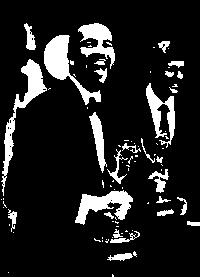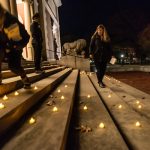Matt Roberts ’93 knew since he was 11 that he belonged on the Late Show with David Letterman. With this singular goal in mind, he landed a job in the ticket office at the show’s Manhattan studio three months after graduating from Bowdoin. That was 19 years ago. Today, he’s an executive producer and writer for Letterman.
On campus recently to talk to students about his post-Bowdoin life, Roberts tried to explain his early-onset love for the Letterman show. He grew up in a small town in Illinois; so a bit of the allure for him was the show’s location. “Wow, New York, taped live,” he recounted his impressions as a kid. “The freedom of that hour – it was a clearinghouse of ideas, silliness and fun.”
Roberts was visiting Bowdoin both to speak to students about his job and also to talk about being a professionally successful gay man. He met first with students at the Resource Center for Sexual and Gender Diversity to share a take-out lunch of pasta from Scarlet Begonias. Roberts spoke candidly about his evolution as a closeted student at Bowdoin to coming out in New York when he was 25. He described being nervous about telling his colleagues: “Will they still like me? Will I still have a future here?” he had wondered. As it turns out, “They were all irrational fears.”
Allen Delong, director of student life and the Smith Union, said he was pleased Roberts coupled his more traditional career talk, which he gave later in the day at Moulton Union, with a personal conversation with students. “I want to coordinate more openly gay alumni to do something like this,” he said. “When we think of inviting alumni here, we should consider the whole picture and what they can contribute professionally and personally.”

Roberts has an easy, approachable, slightly self-deprecating manner, and the students lunching with him quickly warmed to him. He gave out his contact information and encouraged them to get in touch. He also skillfully interwove his many stories: both on how he fulfilled his career ambition, which came with some bumps and many hours of Oprah watching while he anxiously waited to get a job, and also about the emotions he experienced trying to accept his homosexuality.
First off, Roberts filled in the details about how he went from working in the ticket office (and before that, intern) to executive producer at the Letterman show. Although Roberts was unusually focused on this one goal of getting a job at the show, his success at achieving his dream still came down to part pluck and part luck. And it tied in to Bowdoin. As a student he had been president of a student-union committee, affectionately known by the student body as “˜SUC,’ which booked shows on campus.
“Forgive me for tooting my horn, but I was president of ‘SUC.’ When uttered allowed, that doesn’t really come off as a resume builder,” he joked to students. One of the shows SUC brought to campus during his tenure was Penn & Teller, who were regulars then on the Letterman show. When Roberts was driving Teller to the airport and stopped to get lunch, Roberts confessed to him his abiding dream. Teller offered to write a recommendation for him. That letter, clearly, worked.
Over time, Roberts moved up at the show. He’s been a talent researcher, segment producer, writer, supervising producer, and now he’s executive producer and writer. He’s been nominated for 15 Primetime Emmy awards – seven for producing and seven for writing at the Late Show – and he won the Emmy in 2011 for his writing for the 64th Annual Tony Awards.
The students asked Roberts many questions, such as how he likes New York and what he does at his job. The show tapes at 4:30 p.m., and all the writers meet in the morning at 9 a.m. to talk about material, Roberts explained. They share jokes, “knock around ideas,” read newspapers. “We’re sitting around trying to make each other laugh with things that’ll be in the show that night. It’s the highlight of the day. The second highlight is seeing it get played out in front of an audience and get a laugh,” he said, adding, “or not get a laugh, which can be a low point.”
A student also asked Roberts about his impressions of Bowdoin: Had it changed at all since he was here in the early 1990s? “It’s amazing in a lot of different ways,” he answered. “It feels like a more open campus.”

